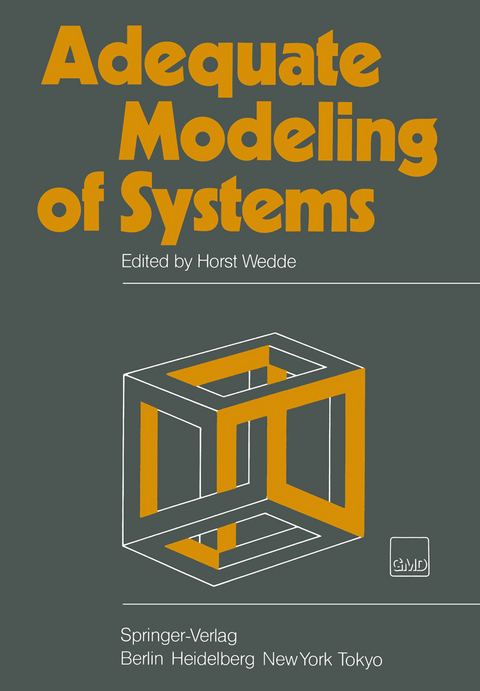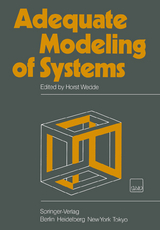Adequate Modeling of Systems
Springer Berlin (Verlag)
978-3-540-12567-9 (ISBN)
This book is based on the proceedings of the "International Working Conference on Model Realism" which was held in Bad Honnef near Bonn, April 20 - 23, 1982. ·Both its theme and format of discussion were unconventional. Their main motivation can be de scribed as follows: In the last several years there has been a growing interest in determining the ex tent to which different methodologies are able to adequately deal with real-world problems of contemporary interest, especially when people from different disciplines are involved in a large-scale project. The conference was to deal with the modeling aspects of different systems theories and approaches. It was intended to be a first step for an ongoing comparative discussion about the way in which methodologies can be used or be combined in order to contribute to systematic problem solutions. In order to get a common basis for a coherent and reliable discussion a set of 3 problem studies was introduced in the Call for Papers, each with a different back ground. They should provide a framework for a more detailed or specific problem de finition in a paper related to one of the problem studies. Slightly adjusted to the book format they are found ahead of the 3 main sections of this book each. The problem studies were constructed as modeling and organization/reorganization problem fields in the context of complex and large-scale real systems.
List of Contents.- Introduction:.- Innovative Conceptual Perspectives for Adequately Modeling Complex Real Systems.- Problem Study 1.- Realism in Hierarchical Modeling: A Fuzzy Systems Approach.- A Logical Approach to Simulation (TS - PROLOG).- Modeling and Simulating Nets of Agencies with BORIS.- A Systems Specification Language.- An Exercise in Achieving Goals in Distributed Systems by Means of Interaction Systems.- Problem Study 2.- Eliciting the Real Problem.- A Group Process Approach to Organizational Change.- The Problem of Model Adequacy Exemplified Using General Nets to Describe a Citizens' Services Department.- Real System Modeling: A Formal but Realistic Approach to Organizational Design.- A High Level Net Language for Stepwise Modeling Organizational Systems.- Some Mathematical Methods for Modeling the Performance of a Distributed Data Base System.- T3SD as a Modeling Methodology.- Problem Study 3.- Quality Assurance of System Design and Model Management for Complex Problems.- Reversal Simulation with Place - Transactor Nets.- Conditions for Living Together of Social Groups.- A Balanced System of Social Groups in a New Suburb: How These Requirements Reflect on a Philosophy of Realistic Model-Building Architecture.- System for Interactive Modeling of Socio-Economic Development.- Real Structure Modeling: Towards a Valid Approach for Social Systems Analysis.- The Use of Structured Design Methodology to Improve Realism in National Economic Planning.- A Preliminary Framework for Urban Model-Building.- Authors' Index.
| Erscheint lt. Verlag | 1.7.1983 |
|---|---|
| Zusatzinfo | XII, 336 p. |
| Verlagsort | Berlin |
| Sprache | englisch |
| Maße | 170 x 244 mm |
| Gewicht | 614 g |
| Themenwelt | Informatik ► Office Programme ► Outlook |
| Mathematik / Informatik ► Mathematik ► Finanz- / Wirtschaftsmathematik | |
| Wirtschaft ► Volkswirtschaftslehre | |
| Schlagworte | Calculus • Distributed Systems • Kompliziertes System • Modeling • Modell (Math.) • organization • Simulation • Systems |
| ISBN-10 | 3-540-12567-1 / 3540125671 |
| ISBN-13 | 978-3-540-12567-9 / 9783540125679 |
| Zustand | Neuware |
| Haben Sie eine Frage zum Produkt? |
aus dem Bereich




